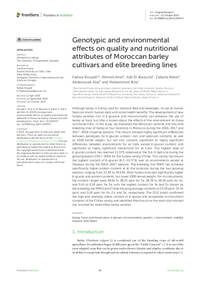Genotypic and environmental effects on quality and nutritional attributes of Moroccan barley cultivars and elite breeding lines

Authors:
Although barley is mainly used for livestock feed and beverages, its use as human feed can enrich human diets with some health benefits. The development of new hulless varieties rich in β-glucans and micronutrients can enhance the use of barley as food, but little is known about the effects of the environment on these nutritional traits. In this study, we evaluated five Moroccan varieties and two elite breeding lines of barley at four locations in Morocco during the 2016–2017 and 2017–2018 cropping seasons. The results showed highly significant differences between genotypes for β-glucan, protein, iron, and selenium contents, as well as 1000 kernel weight, but not zinc content; significant to highly significant differences between environments for all traits except β-glucan content; and significant to highly significant interactions for all traits. The highest level of β-glucan content has reached 11.57% observed at the Sidi El Aydi site during the growing season 2017–2018 for the hulless variety Chifaa. This variety has shown the highest content of β-glucan (6.2–11.57%) over all environments except at Tassaout during the 2016–2017 seasons. The breeding line M9V5 has achieved significantly higher protein content at all the locations during the two growing seasons, ranging from 12.38 to 20.14%. Most hulless lines had significantly higher β-glucan and protein contents, but lower 1000 kernel weight. For micronutrients, the content ranges were 28.94 to 38.23 ppm for Fe, 28.78 to 36.49 ppm for Zn, and 0.14 to 0.18 ppm for Se, with the highest content for Fe and Zn shown by the breeding line M9V5 and Chifaa showing average contents of 33.39 ppm, 35.34 ppm, and 0.18 ppm for Fe, Zn, and Se, respectively. The GGE biplot confirmed the high and relatively stable content of β-glucan and acceptable micronutrient contents of the Chifaa variety and identified Marchouch as the most discriminant site to breed for biofortified barley varieties.
